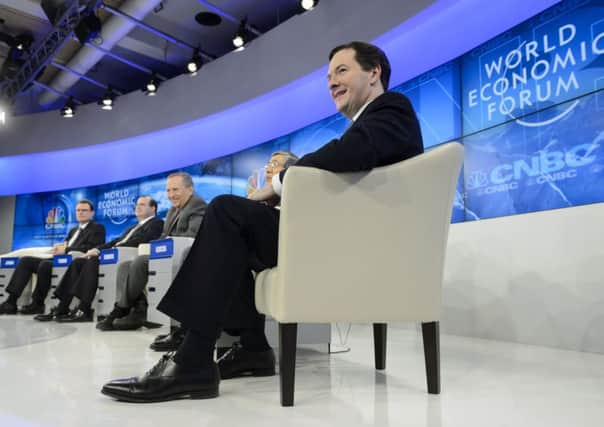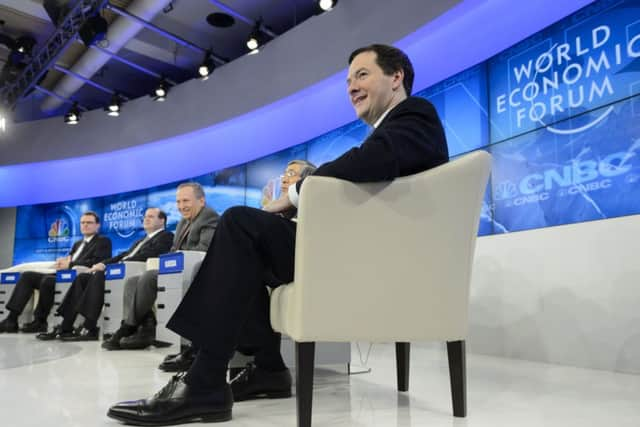Britain enjoys best economic growth since 2007


George Osborne hailed official figures revealing that Gross Domestic Product (GDP) increased by 1.9 per cent in 2013, the healthiest rate of growth since 2007.
The increasing growth, the Chancellor claimed, was proof that the UK government’s long-term economic plan to cut the deficit was working.
Advertisement
Hide AdAdvertisement
Hide AdThe figures, from the Office for National Statistics (ONS), showed that the pace of recovery fell slightly in the fourth quarter of last year to 0.7 per cent. Economists, however, are predicting annual improvement of up to 3 per cent for 2014.


The Chancellor’s suggestion that the figures were further vindication of his austerity measures were disputed by Labour, who argued that the recovery has yet to break through to ordinary pay packets.
Despite the improving figures, GDP still remains 1.3 per cent below its pre-recession peak in the first quarter of 2008.
Mr Osborne said: “These numbers are a boost for the economic security of hard-working people. It is more evidence that our long-term economic plan is working.
“But the job is not done, and it is clear that the biggest risk now to the recovery would be abandoning the plan that’s delivering jobs and a brighter economic future.”
Prime Minister David Cameron tweeted: “The GDP figures are another sign our long-term economic plan is working – more growth means more jobs, security and opportunities for people.”
But Labour and the unions said these improved figures had yet to make an impact on the cost of living. They pointed out that wage growth was lagging behind inflation and argued that a recovery led by house prices and consumer debt could prove unsustainable.
Shadow chancellor Ed Balls said: “For working people facing a cost-of-living crisis this is still no recovery at all.
Advertisement
Hide AdAdvertisement
Hide Ad“And with business investment still weak, construction output down and housing demand outstripping housing supply, this is not yet a recovery that is built to last.”
Trades Union Congress (TUC) general secretary Frances O’Grady said: “Any return to growth is welcome, but this is the wrong kind of recovery and is two years late.
“The recovery is yet to reach whole swathes of the country or feed into people’s pay packets. This must change if the benefits of recovery are to be felt by both businesses and workers.”
In the final quarter of 2013, output increased in three of the four main industrial groupings within the economy. Output increased by 0.5 per cent in agriculture when compared with the same period in 2012. Production increased by 0.7 per cent and the biggest increase was seen in the service sector where there was a rise of 0.8 per cent.
That trend was not mirrored in construction, however, which experienced a 3 per cent drop.
Yesterday’s figures did not include a breakdown of GDP figures for the constituent countries of the UK.
Therefore there was not an accompanying up-to-date growth figure for economic growth north of the Border.
In Scotland, politicians’ reactions to the GDP figures depended on which side of the constitutional fence they stood on.
Advertisement
Hide AdAdvertisement
Hide AdThe Scottish Secretary Alistair Carmichael claimed the improving economic performance illustrated the benefits of staying within the United Kingdom.
SNP finance secretary John Swinney welcomed the improvement, but said it had materialised “despite” the UK government’s economic policies.
Mr Swinney said the most recent figures for economic growth in Scotland indicated it was outperforming the rest of the UK – a disparity, he claimed was down to his SNP administration’s policies.
Mr Carmichael said: “The fact the GDP figures show the strongest rate of annual economic growth since 2007 is good news for Scotland. The economy has grown by 0.7 per cent for the quarter and by 1.9 per cent over 2013. This comes on the back of a sustained period of good news for the Scottish and UK economy. Our plan for the economy is working and there is still a great deal of work to do.
“The UK GDP figures come in the wider positive context which show the inflation rate dropping to 2 per cent from a peak of 5.2 per cent in September 2011, a recovering labour market and both the World Bank and the IMF indicating they expect higher global economic growth in 2014.”
Mr Swinney said the UK economy was still well below pre-recession levels and the performance was worse than any G7 country except Italy.
“It is clear that recovery is happening in spite of the actions of the UK government, rather than because of them,” Mr Swinney said. “As a result growth forecasts are now 5.9 per cent lower than originally predicted and borrowing is £197 billion higher.
“Scotland has taken a different route where possible and the official figures show that after 18 months of consistent growth our economy is 0.9 per cent below its pre-recession peak in output, compared to the UK as a whole which is still 1.3 per cent below even after today’s figures.
Advertisement
Hide AdAdvertisement
Hide Ad“These figures show once again why Scotland needs the full powers of independence in order to pursue economic policies appropriate for Scotland’s businesses and people.”
Terry Murden: Foundations look secure but there is a lot of building still to do before Osborne can relax
RECOVERY has been a long time coming but before anyone gets carried away there is a need to ask what lies behind it and how strong it is going to be.
The upturn last year came more quickly than some expected, as did the fall in unemployment, but there are a number of features about this rebound that should make us just a little cautious about Chancellor George Osborne’s “brighter economic future”.
Firstly, about three-quarters of British output is services based. Exports remain weak, as does business investment. It should be noted that manufacturing and construction both shrank in the fourth quarter.
There has been a recovery in consumer spending, but, because wage levels are not rising in line with inflation, much of it is fuelled by borrowing. This is a worry and needs to be corrected to avoid another debt-induced spending binge.
The Governor of the Bank of England, Mark Carney, is concerned by these trends and by the need for Britain to start selling more products overseas. Even so, the Canadian has been a lucky man, arriving at the Bank just as the economic tide turned in his favour. His job now is to ensure the recovery takes a firm hold and that any further stimulus is aimed at building on increasing business confidence.
Four consecutive quarters of growth have clawed back most of the output lost since 2009 and suggest that firm foundations are being laid. Economists are busy re-calculating their forecasts upwards – with talk of 3 per cent growth gathering pace – and working out what happened to predictions post-2009 of a “lost decade”.
Advertisement
Hide AdAdvertisement
Hide AdUnsurprisingly, Scottish finance secretary John Swinney leapt on the fact that the economy remains 1.3 per cent smaller than it was in 2008 and claimed any recovery was in spite of the coalition and not because of it.
Well, he would say that, wouldn’t he? A recovery in the UK economy is the last thing the Yes campaign needs this year as it is likely to play into the hands of the unionists.
Rather than point to Scotland’s marginally better performance (which may be because of the union), Swinney would be better pointing out that the main beneficiary of the upturn is London.
For Osborne, unless his form dips, or the economy is hit by some external factors, then he will feel confident for the remainder of what will be a crucial year for the union and the run-up to the next UK general election.
SEE ALSO